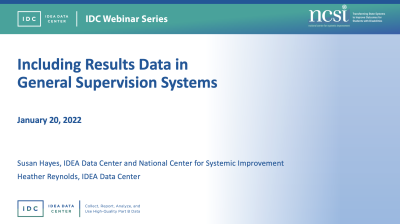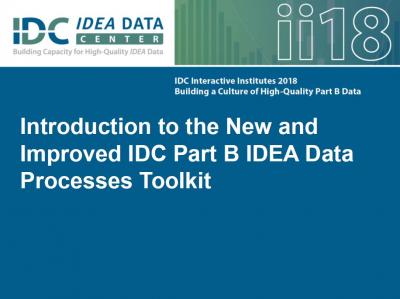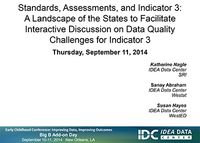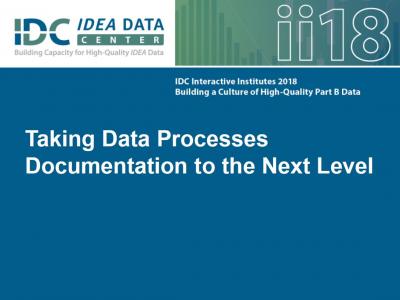Site Search
Results 1 - 7 of 13
-
Including Results Data in General Supervision Systems
This IDEA Data Center (IDC) and National Center for Systemic Improvement (NCSI) joint webinar focused on learning from states that are working to meaningfully include student results or outcomes data in their general supervision systems. Presenters shared “lessons learned” from state work, including both important considerations for states that are in the planning stages, as well as for those actively engaged in centering results data in their accountability and support systems. Participants also heard how states can integrate data use as part of their general supervision system.
-
Norms of Collaboration: Strategies for Working Together Effectively in Person and Virtually
Following the norms of collaboration for working in groups can help groups accomplish their goals more effectively. Attending to the norms of collaboration takes on even greater importance as, more than ever, group members are working together in virtual environments. Norms of collaboration include behaviors such as pausing, paraphrasing, putting inquiry at the center, probing for specificity, putting ideas on the table, paying attention to self and others and presuming positive intentions. This IDC professional development experience helped attendees learn more about the norms of collaboration; how they can contribute to positive, productive group dynamics; and ways to apply the norms when working both in-person and virtually with others.
Format: Presentations
Introduction to the New and Improved IDC Part B IDEA Data Processes ToolkitThis workshop provided a brief overview of the new IDC IDEA Part B 616 Data Processes Toolkit. Several states that have piloted the toolkit shared their experiences with creating data processes for the SPP/APR indicators, building capacity of data stewards, and instilling a culture of high-quality data. Presenters facilitated discussion that helped participants understand the value of data processes documentation and afforded them an opportunity to experience preparing for and beginning this work.
Format: Quick Reference
Navigating Uncharted Waters: Engaging Stakeholders in Part B Indicator 3 Baseline and Target SettingThis customizable resource includes a PowerPoint template and presentation notes that provide states with an overview of the Part B SPP/APR reporting changes to Indicator 3, which addresses participation and performance of children with individualize education programs (IEPs) on statewide assessments. The resource reviews the new requirements related to stakeholders, particularly parents, in the SPP/APR and implications for Indicator 3 and shares strategies for engaging stakeholders in the optional baseline and required target setting processes. States are able to customize the information in the PowerPoint to reflect their own contexts and to meet the needs of different audiences.
Format: Presentations
Standards, Assessments, and Indicator 3: A Landscape of the States to Facilitate Interactive Discussions on Data Quality Challenges for Indicator 3Members of IDC's Tools and Products Assessment workgroup presented an overview of states and entities across several pertinent variables: a) current information on each state's standards, current state assessments, and assessment plans; and b) 2011-12 information on Part B Indicator 3. Presenters conducted an interactive discussion identifying data quality issues around Indicator 3 and solicited suggestions for tools and products to improve data quality for this indicator.
Format: Presentations
Taking Data Processes Documentation to the Next LevelThis workshop provided participants an opportunity to envision and begin development of a comprehensive plan for creating protocols and follow-up activities they may use at both the SEA and LEA levels. Session activities focused on identifying appropriate roles to be represented at the table. They also focused on methods for engaging staff in the work and other critical considerations for implementing and sustaining these foundational data practices.








